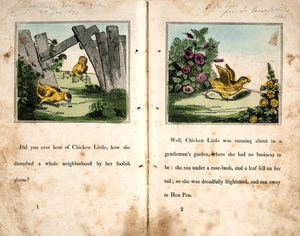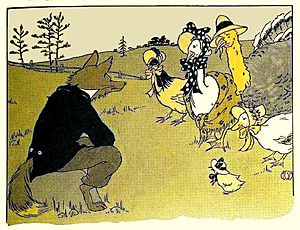Henny Penny facts for kids
Henny Penny, more commonly known in the United States as Chicken Little and sometimes as Chicken Licken, is a folk tale with a moral in the form of a cumulative tale about a chicken who believes the world is coming to an end. The phrase "The sky is falling!" features prominently in the story, and has passed into the English language as a common idiom indicating a hysterical or mistaken belief that disaster is imminent. Versions of the story go back more than 25 centuries; it continues to be referred to in a variety of media.
The story and its name
There are several Western versions of the story, of which the best-known concerns a chick that believes the sky is falling when an acorn falls on its head. The chick decides to tell the King and on its journey meets other animals (mostly other fowl) which join it in the quest. After this point, there are many endings. In the most familiar, a fox invites them to its lair and then eats them all. Alternatively, the last one, usually Cocky Lockey, survives long enough to warn the chick, who escapes. In others all are rescued and finally speak to the King.
In most retellings, the animals have rhyming names, commonly Chicken Licken or Chicken Little, Henny Penny or Hen-Len, Cocky Locky, Ducky Lucky or Ducky Daddles, Drakey Lakey, Goosey Loosey or Goosey Poosey, Gander Lander, Turkey Lurkey and Foxy Loxy or Foxy Woxy.
The moral to be drawn changes, depending on the version. Where there is a "happy ending", the moral is not to be a "Chicken" but to have courage. In other versions where the birds are eaten by the fox, the fable is interpreted as a warning not to believe everything one is told.
In the United States, the most common name for the story is "Chicken Little", as attested by illustrated books for children dating from the early 19th century. In Britain and its other former colonies, it is best known as "Henny Penny" and "Chicken Licken", titles by which it also went in the United States.
Images for kids
See also
 In Spanish: Henny Penny para niños
In Spanish: Henny Penny para niños




